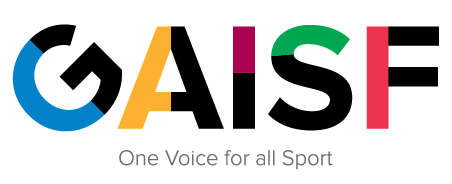.sport - a trusted ecosystem of information and communications for the community
Global Association of International Sports Federations

Session 206
Background:
In the context of the new gTLD program launched by ICANN, the Global Association of International Sports Federations (GAISF) applied for the .sport domain name. GAISF objective towards this application is to provide the legitimate actors of the sport community with a new trusted digital ecosystem dedicated to serve and protect them.
The New gTLD Program is an initiative coordinated by the Internet Corporation for Assigned Names and Numbers (ICANN) that is enabling the largest expansion of the domain name system. Via the introduction of new top-level domains (TLDs), the program aims to enhance innovation, competition and consumer choice.
To fulfil this objective, the GAISF developed high standards of governance, illustrated by strict accessibility criteria and strong usage policies. The GAISF also launched innovative models of attribution and activation of domain names. As an example, recognized International Federations can apply for a portfolio of domain names which includes qualified names in more than 30 languages. GAISF also develops specific program to offer tailor-made access conditions to targeted groups such as athletes.
With this approach, the use of .sport gives a greater degree of distinctiveness, visibility and legitimacy, allowing trusted members of the community to develop their digital presence.
Objective:
The objective of this workshop is to reach out through the WSIS Forum to a wide variety of stakeholders on the topic of the .sport Project. The .sport Project is an effort by and for the Sport community to support, consolidate and extend a sustainable digital ecosystem for all its stakeholders.
At the center of the .sport Project is the principle of trusted online identifiers, easily recognizable by and memorable to users. Users relying on Internet names ending in .sport can safely infer a guarantee of legitimacy, community-based oversight, sustainable standards of online conduct and the respect of the values of Sport. The .sport Project stands at the intersection between the community-based governance model of the Sport community and the multistakeholder Internet governance model. The Global Association of International Sports Federations (GAISF) thus supports the sport community with a new trusted digital ecosystem designed to serve and protect all stakeholders.
Outcomes:
Demonstrate the social and economic benefits of a standardized and trusted digital space for the sport community and beyond.
Provide concrete examples of innovative approaches in the field of community-based domain names.
Develop an ongoing dialogue about online identifiers with ICT experts in the context of the WSIS Forum.
Promote the .sport ecosystem and invite stakeholders to join it.
Moderator
Pierre Germeau, Head of Digital Services, GAISF
Speakers/Panellists
· Mr Tom Dielen, Secretary General of World Archery Federation and President of the DotSport Policy Advisory Board.
· Mr. Laurent Ferrali, Senior Director Government and IGO Engagement at ICANN
· Mr Werner Staub, Executive Committee Member at CORE Internet Council of Registrars
· Mr Pierre Germeau, Head of Digital Services
Session's link to WSIS Action Lines
-
 C5. Building confidence and security in the use of ICTs
C5. Building confidence and security in the use of ICTs
-
 C7. ICT Applications: E-business
C7. ICT Applications: E-business
-
 C7. ICT Applications: E-learning
C7. ICT Applications: E-learning
-
 C7. ICT Applications: E-health
C7. ICT Applications: E-health
-
 C9. Media
C9. Media
-
 C10. Ethical dimensions of the Information Society
C10. Ethical dimensions of the Information Society
-
 C11. International and regional cooperation
C11. International and regional cooperation
The .sport extension constitutes a rules-based process to create and maintain reliable online signposts related to sport, visible to the public at large. If a domain name in an Internet address ends in .sport, users can infer that this is a sport-related information resources compliant with the community-based .sport policies.
These features have particular relevance for the following WSIS Actions lines for the reasons stated below:
C5.* Building confidence and security in the use of ICTs
As a publicly recognizable and strictly supervised label of quality, the .sport extension supports users’ need to distinguish verified or community-endorsed resources from those offering no assurances.
C7.* ICT Applications: E-business
As an instrument of community-based action by the Sport community, the .sport extension supports e-business through trusted content and advertising.
C7.* ICT Applications: E-learning
Sport is a key component of education and learning, and as sport brings together people of all ages. Sport is also one of the most widely shared and accessible fields of intellectual exercise supporting a culture of objectivity, transparency and rules-based decision-making. The .sport extension helps the sport governing bodies, sport clubs and governments’ communicate using Internet addresses recognizable as verified by the public at large, in a highly aspirational context. This makes e-learning easier and safer in practical terms.
C7.* ICT Applications: E-health
Sport is a key activity related to health for people of all ages anywhere. Health-related information and advice related to sport are more accessible to the public at large and often have higher chances of adherence than purely medical channels alone. For this to work, however, online users must be able to distinguish trustworthy information from community-endorsed sources from potential quackery or unsafe advice. In maintaining verified addresses through sport governing bodies, local government, national federations and clubs, the .sport extension supports e-health initiatives.
C9.* Media
Sport is intrinsically well-suited for both advertising and paid content. As such, it constitutes a mainstay for the media ecosystem. Media have been radically transformed by the Internet, especially by online resources that allow personal tracking and targeting. As most media firms are unable to sustain personal targeting on their own, they tend to lose out to online intermediaries in terms of end-user attention as well as advertising income. This has worsened to a point that affects their ability to produce trustworthy content. The .sport registry works on collaborative projects with governing bodies and publishers through which sport content is delivered on easily guessable, memorable and re-visitable Web addresses. That in turn supports advertising-by-context as a sustainable alternative to the personal tracking targeting.
C10.* Ethical dimensions of the Information Society
One of the most insidious ethical challenges of the information society is the constant pressure on users to reveal information about themselves as well as colleagues, friends and family to online intermediaries. They are often forced to do so in order to obtain online services, such as messaging, social networks or even connectivity. The .sport extension is one initiative (among hopefully many others) to develop a sustainable ecosystem that avoids the Faustian bargain of online services in exchange for submission to invasive practices of often unknown and unaccountable market participants. The essential features of these initiatives are ways to support economically profitable online services, based on informed choice, anchored in meaningful Internet addresses, funded by publicly transparent advertising and product offerings.
C11.* International and regional cooperation
The Sport community has always collaborated internationally and regionally. The creation of the .sport extension itself is a collaborative project entrusted to the GAISF, the Global association of international sport federations. Most of the over 8000 domain names ending in .sport registered to date are controlled by international sports federations and governing bodies. They are used to support the national and regional sport governing bodies, sport events and sport initiatives…
Session's link to Sustainable Development Process
-
 Goal 3: Ensure healthy lives and promote well-being for all
Goal 3: Ensure healthy lives and promote well-being for all
-
 Goal 4: Ensure inclusive and equitable quality education and promote lifelong learning opportunities for all
Goal 4: Ensure inclusive and equitable quality education and promote lifelong learning opportunities for all
-
 Goal 5: Achieve gender equality and empower all women and girls
Goal 5: Achieve gender equality and empower all women and girls
-
 Goal 11: Make cities inclusive, safe, resilient and sustainable
Goal 11: Make cities inclusive, safe, resilient and sustainable
-
 Goal 16: Promote just, peaceful and inclusive societies
Goal 16: Promote just, peaceful and inclusive societies
The .sport internet extension and its projects are particularly relevant for the following sustainable development goals for the reasons described below:
Goal 3:* Ensure healthy lives and promote well-being for all
Sport-related communications are key to promote the safe and healthy practice of sport, which in turn is key for health and well-being. As a growing number of users even in poor countries are able to use smartphones, they must be able to navigate by way of trustworthy web addresses. The community-based oversight of web-addresses ending in .sport is therefore very economical and sustainable contribution to health and well-being.
Goal 4:* Ensure inclusive and equitable quality education and promote lifelong learning
Sport is an aspirational activity as well as a source of inspiration. Safe sport-related communications, by way of the a person’s informed Internet navigation using Web addresses subject to community-based oversight, or supporting community-based initiatives, are a sustainable way to achieve a widely shared focus on lifelong learning.
Goal 11:* Make cities inclusive, safe, resilient and sustainable
The city is a natural focal point of sport activities. The .sport extension manages city names with particular attention to ensure users can trust the domain names composed of the city name combined with the .sport extension, working in collaboration with local authorities or publishers. This is highly economical and sustainable approach to achieving inclusiveness and safety for cities, starting with the safe use of their name, using the .sport extension as a mark of community-based oversight and standards of conduct.
Goal 16:* Promote just, peaceful and inclusive societies
The practice and the witnessing of sport - provided they involve communications based on the true values of sport - is intrinsically conducive to social justice, peace and inclusiveness. The .sport Internet extension constitutes a label of quality of communications focused on the true values of sport.